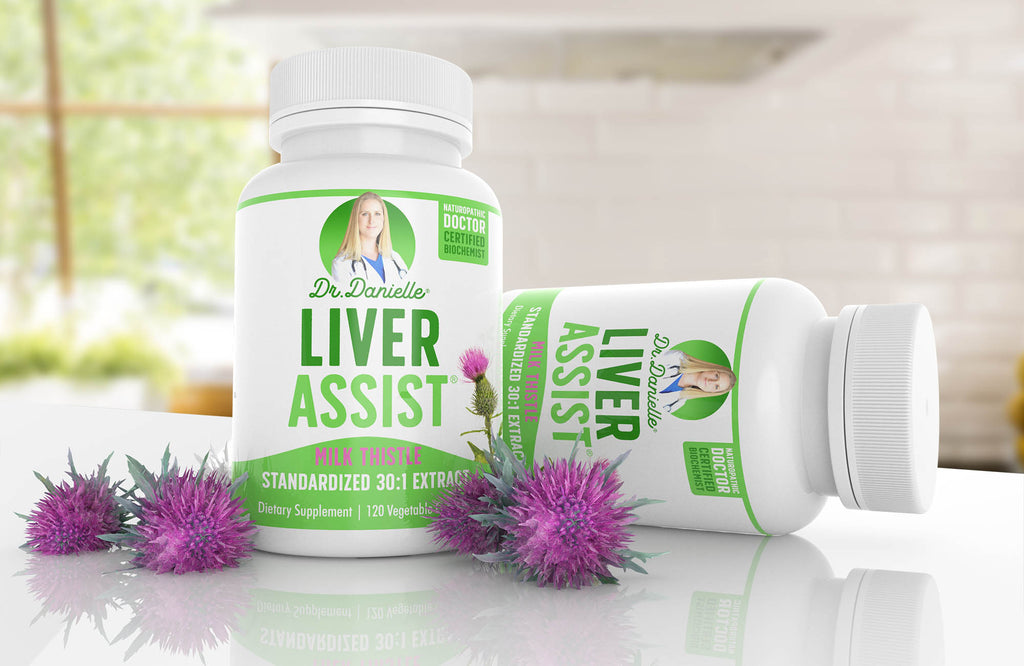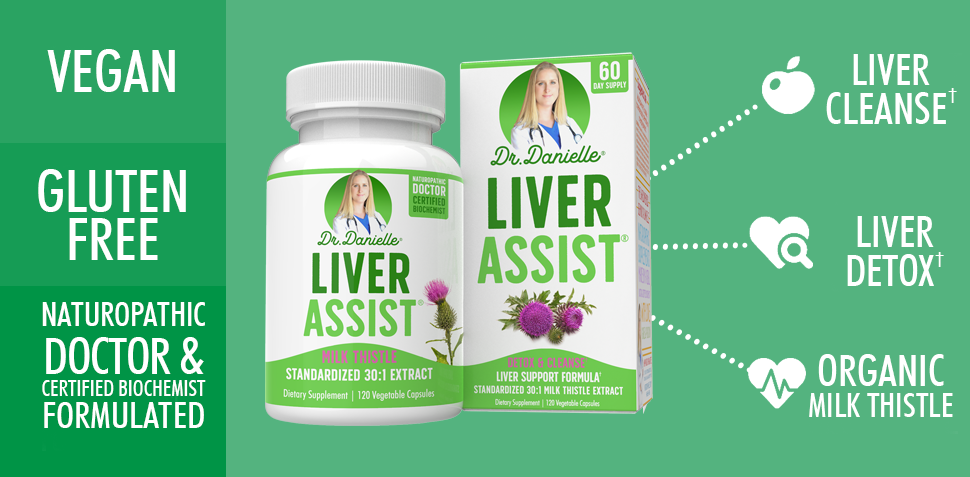Chances are, in this day and age, you've used a herbal supplement at some point: ginkgo to improve cognition, echinacea to prevent colds, and essential oils to dull a headache. Even so… You may be taken aback when you hear that a little spiky plant could potentially be your ticket to a healthier liver. But which small spiky plant, exactly? Well, it's the milk thistle plant–also known as Silybum marianum (1). Prickly yet pretty, this is a plant with a long, thin stem, spiny leaves, and a purplish-pink thistle at the top. When its leaves are crushed or ripped, a milky white liquid oozes out. This long-revered liquid contains silymarin, a group of compounds known to have antioxidant, antiviral, and anti-inflammatory properties (2, 3, 4, 5).
As a result, milk thistle is sought-after for its list of health benefits: from weight loss to skin health to even promoting breast milk production in new mothers. Regardless. As mentioned earlier, one of its most well-known benefits is that of a natural liver supporter. In fact, this plant has traditionally been used to treat all types of liver problems (e.g. hepatitis and cirrhosis). Still skeptical? Don’t worry. This article provides you with a list of convincing, science-backed evidence that milk thistle is indeed good for your liver. Let’s get started.
Mitigates Alcohol Consumption’s Harmful Effects

Are you a fan of the occasional alcoholic beverage? TGIFs, for instance? There's a good chance you do. Now, be honest–do you like to enjoy a, well, let's just call it a more-than-occasional, alcoholic beverage? If the answer is yes, then milk thistle is a must-have. To understand why you first need to know that your liver is particularly susceptible to alcohol-related injury because it is the primary alcohol metabolism site. As your liver breaks down all the TGIF drinks (and pre-bed glasses of wine!), several potentially dangerous by-products are generated, including acetaldehyde and highly-reactive molecules known as free radicals (6, 7, 8, 9).
While your liver is very resilient, the fact remains that every time your liver filters alcohol, some of the liver cells die (10, 11). Your liver is capable of regenerating itself–but excess drinking over the years can reduce its ability to regenerate. The result? Serious and permanent damage to your liver. Thankfully, good news comes in the form of milk thistle. Multiple studies on silymarin–the active ingredients found in milk thistle–suggest that it may detoxify some of the harmful by-products (e.g. acetaldehyde) caused by the breakdown of alcohol, thus protecting your liver (12). Plus, it can also neutralize the harmful, highly-reactive free radicals (13). And to top it all off, research indicates that silymarin could help turn off the inflammatory signals activated by alcohol (14)!
Alleviates Symptoms Of Non-Alcoholic Fatty Liver Disease (NAFLD)

What Is NAFLD?
Think your liver is in tip-top shape because you rarely imbibe, if ever? Unfortunately, it may not be–because of something called ‘non-alcoholic fatty liver disease (NAFLD).’ Here’s some background information on it. Fatty liver occurs when excess fat builds up in liver cells. Over time, this can cause inflammation and damage to your liver cells, in turn, leading to fibrosis (i.e. scar tissue), as liver cells are repeatedly injured and die off (15). Worryingly, the prevalence of NAFLD is increasing rapidly with the obesity and diabetes mellitus epidemics. It is estimated to range from 5% to 18% in Asians and 20% to 30% in the Western population (16, 17). As a testament to just how damaging NAFLD can be to your health: studies also indicate a link to an increased risk of other chronic diseases, including heart disease, kidney disease, and diabetes (18, 19, 20).
How To Get Rid Of NAFLD
There are several lifestyle changes you can make to prevent or get rid of a fatty liver. Losing weight is one of the best ways for you to reverse fatty liver if you're overweight or obese, for instance (21, 22, 23). Other studies have also shown that consuming diets low in refined carbohydrates (e.g. white rice and sugary foods) may help reverse NAFLD (24, 25, 26, 27).
But… What if you’re not obese–and you’re already consuming a diet low in refined carbs, like the ketogenic diet or the Mediterranean diet? Milk thistle may be your answer. Impressively, research has found that this herbal remedy (ranging between 250 mg to 376 mg)–alone or in combination with vitamin E–may help reduce insulin resistance, inflammation, and liver damage in individuals with NAFLD (28, 29, 30, 31). A 90-day study of individuals with fatty liver, for example, showed that the group of participants who took a silymarin-vitamin E supplement and followed a low-calorie diet experienced twice the reduction in liver size as those who followed the diet without taking the supplement (32).
Improves Liver Function Tests For Individuals With Hepatitis

Just so you know, hepatitis refers to an inflammatory condition of the liver (33, 34, 35). It can occur as a secondary result of medications, drugs, toxins, and alcohol use. But in most cases, it’s caused by a virus. This is commonly known as viral hepatitis–and the most common forms are hepatitis A, B, and C. Now, while hepatitis A is highly-contagious, it typically causes only a mild illness. And almost always goes away on its own without causing any long-term liver damage. The ones you should worry about are, therefore, hepatitis B and C.
That's because about 15% to 25% of individuals with hepatitis B get chronic liver disease, including cirrhosis, liver damage, and most serious of all, liver cancer (36, 37). Think these statistics are scary enough? Research indicates that hepatitis C is more likely than hepatitis B to progress into a chronic condition (38, 39, 40)! Of course, the first-course treatment for chronic hepatitis B and C is always antiviral medication; these drugs prevent the virus from replicating (i.e. creating copies of itself) and may prevent progressive liver damage.
But remember how milk thistle has antiviral effects? Because of this, scientists also postulate that milk thistle could be a promising treatment option for hepatitis. Early research even suggested that taking milk thistle extracts by mouth could help improve liver function tests (41)!
Is Milk Thistle Safe?

Convinced of milk thistle’s beneficial effects on the liver–and are just wondering about its safety before you grab yourself a bottle of milk thistle extract? Thankfully, milk thistle is generally considered safe when taken by mouth (42, 43). In fact, even in trials where researchers used high doses of milk thistle for long periods, only about 1% of participants experienced side effects. And these side effects are nothing to worry about. That’s because most of them involve gut disturbances like nausea, diarrhea, or bloating.
That said, if you belong to any of the groups below, you may want to consult your doctor before starting on a milk thistle supplement:
Pregnant Women
Even though milk thistle has been traditionally used in pregnant and breastfeeding women, its safety is unknown in these subgroups. It's still better to play it safe.
Allergic To The Asteraceae/Compositae Family Of Plants
Milk thistle can trigger allergic reactions, especially in those who’re allergic to kiwi, artichokes, ragweed, daisies, marigolds, and chrysanthemums. These are plants that belong to the Asteraceae/Compositae family of plants.
Individuals With Diabetes
Recent studies highlight that milk thistle may work similarly to some diabetic medications by enhancing insulin sensitivity and decreasing blood sugar (44, 45). Despite its potential as an alternative treatment option for diabetes though, its blood sugar-lowering effects may put individuals with diabetes at risk of low blood sugar (i.e. hypoglycemia), which can, in turn, escalate into a medical emergency.
People With Hormone-Sensitive Conditions
Milk thistle has been shown to exert estrogenic-mimicking effects–on par with common soy isoflavones–which may worsen hormone-sensitive conditions, including some types of breast and ovary cancers (46).
Only Choose High-Quality Milk Thistle Supplements

It’s worth noting that unlike pharmaceutical drugs, the Food and Drug Administration (FDA) does not regulate dietary supplements. Meaning? Those milk thistle supplements you see on the shelves are not subject to the same strict processes, like clinical trials, to prove their effectiveness, purity, or marketing claims. This thus begs an important question: how do you determine which milk thistle supplement, out of the many available, is safe and effective?
First, buy your supplement from a reputable source. Second, you'll want to make sure that the supplement is organic–this ensures that you're not taking in harmful pesticides into your body! And last, but arguably the most important, keep an eye out for products that cite 'Good Manufacturing Practices (GMP).' This indicates that the brand you're buying from is transparent about the ingredients they put into the supplement and that what is on the label can actually be found in the bottle.
Don’t have the time to hold up a magnifying glass to every milk thistle supplement’s ingredient labels? Here’s a shortcut. Go for Dr. Danielle’s Liver Assist Supplement. It’s made with the highest-quality organic milk thistle extract (standardized to 80% total flavonoids) and is GMP certified. Your search for the ultimate liver support supplement is over.









